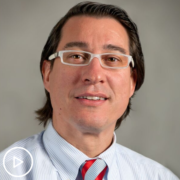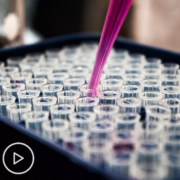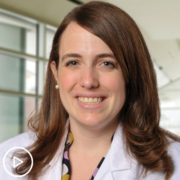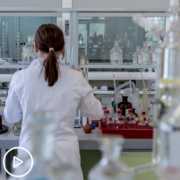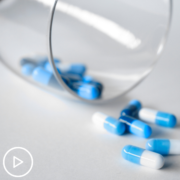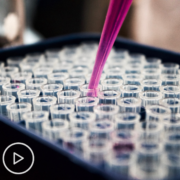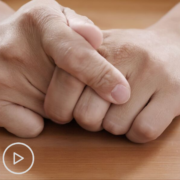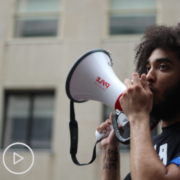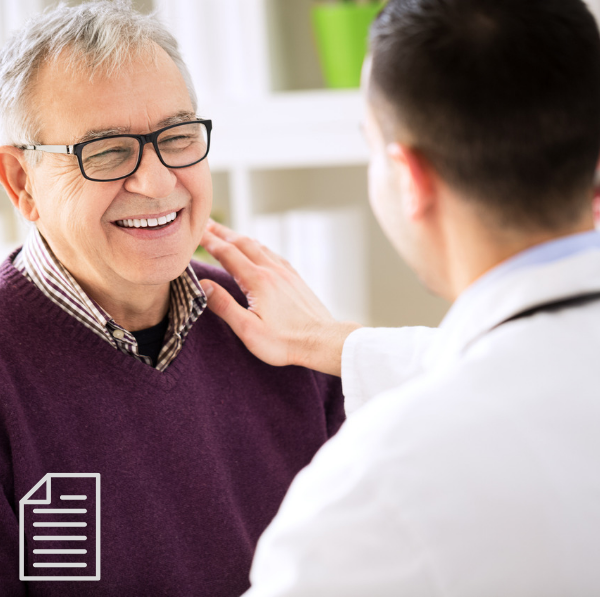Fact or Fiction? CLL Causes and Symptoms from Patient Empowerment Network on Vimeo.
How do you decipher what’s fact and what’s fiction when it comes to chronic lymphocytic leukemia (CLL) causes and symptoms? Dr. Kerry Rogers shares updates in CLL research and tackles common questions and misconceptions.
Dr. Kerry Rogers is a hematologist-oncologist at The James Cancer Hospital and Solove Research Institute.
View The Fact or Fiction? CLL Causes & Symptoms Resource Guide
Related Resources
Transcript:
Patricia:
Welcome to Fact or Fiction: CLL Causes and Symptoms. Today, we’re talking about chronic lymphocytic leukemia. We’ll debunk misconceptions about CLL causes and symptoms. I’m Patricia Murphy, your host. Joining me today is Dr. Kerry Rogers. Dr. Rogers, thanks so much for taking the time. Why don’t you introduce yourself?
Dr. Rogers:
My name is Kerry Rogers. I am a hematologist, and I work at the Ohio State University in Columbus, Ohio, and thank you very much for inviting me. This is one of my favorite topics – talking about chronic lymphocytic leukemia.
Patricia:
Fantastic. Well, before we get started, this program is not a substitute for medical advice, so please, consult your medical care team or you – before we get started, this program is not a substitute for medical advice, so please refer to your healthcare team with any questions.
Patricia:
Dr. Rogers, let’s just get a brief overview of CLL and how it progresses.
Dr. Rogers:
So, I’m sure everyone already knows that chronic lymphocytic leukemia is a chronic blood cancer of a cell called the B lymphocyte, and with the frequency that people are getting blood tests these days in the United States, the most common way that I see people diagnosed with this at this time is actually just having an increased white blood cell count when they went to get routine blood counts.
So, it seems like the majority of people being diagnosed are diagnosed at a time when they’re not actually having symptoms from the disease, and maybe everyone already knows or not, but the way that’s managed is that the disease is actually just monitored until some sort of what I like to call “problem” from it develops.
So, I’ll go over what the problems are that can come along as the CLL progresses, but it’s important to realize that there’s many people alive and living with CLL doing very well and not having any problems from the disease yet, and I’ve seen a couple people that have had this disease longer than I’ve been a doctor, and one person that almost had this longer than I’ve been alive with no problems from it.
So, developing something from CLL that’s gonna need treatment is not universal. So, as the – for the majority of people, though, CLL – over its natural history – will go on to progress to cause what I like to refer to as “problems” from it. Some people call them “treatment indications.”
So, when problems are developing is about the time you consider treatment before you get really sick from it, and there’s a couple main ways that the CLL can cause problems. One is that the CLL can build up in the places where those cells live, which is the lymph nodes, so people can get really big lymph nodes in their neck, in their groin area, sometimes inside the body, causing problems. And, lots of people have small lymph nodes that aren’t causing problems, and that’s okay, but if they become really big or problematic, then it’s time to do something about them.
The cells can also build up in the bone marrow, so the bone marrow produces all your healthy, normal blood cells that go into the blood and have a lifecycle in the blood. So, if your bone marrow fills up with CLL cells, then you can’t produce the regular, healthy blood cells, and it’s time to do something about the CLL.
Sometimes, the white count can get really high, and that’s not always a reason to do something, but most people do see – over the natural history or course of having CLL – their white blood cell count and lymphocyte count increases, and there’s not actually a firm number where you say, “Boy, you hit X number, it’s time to treat this,” but if the count is increasing rapidly, then usually, you want to treat this before it increases so much that you develop an issue from that. And then, the last category of things that happen with CLL that’s a problem from it are what we call constitutional symptoms.
So, this can be fatigue that’s limiting your activities, like I took care of someone that was too tired to get the mail from his porch due to CLL. He’s doing great now, but that would be a problem. Sometimes drenching night sweats or an extreme weight loss – and, I’m not talking about people that do Atkins diet lose weight, I’m talking about people that are eating everything and losing weight just because of the CLL.
And, the reason this happens that – CLL is a cancer of B lymphocytes, which are immune system cells, so they can release some of the same chemical mediators that your immune system releases for an infection, and that’s what causes some of those symptoms. But, the main things that progress over the course of having CLL are increasing lymph nodes, lowering of your healthy blood counts due to increasing CLL in the bone marrow, the white count can go up rapidly, or people can develop really problematic constitutional symptoms from it.
Patricia:
Let’s talk a little bit about how CLL is staged, Dr. Rogers.
Dr. Rogers:
So, unlike most cancers, where CLL is staged with CT scans or PET scans, the staging for CLL is actually remarkably simple, and I really like this because it limits the amount of testing you have to do for people, especially the people that might be just monitored for their CLL or observed. You don’t wanna put them through a lot of intensive testing they don’t need. So, the only two things you need to properly stage CLL are a complete blood count and a good physical exam.
So, in the United States, we use something called RAI staging, which is R-A-I staging, and before I launch into what it is, I will just say that even RAI stage 4 CLL is very treatable, and people do well for many years, so this is not the same as when you think about lung cancer or breast cancer staging, where stage 4 is a much worse spot than stage 1. The staging for CLL – all of it is still very treatable.
So, RAI stage 0 is when you only have an increase in lymphocytes, which is the CLL cells in the blood. Stage 1 is when you have increasing lymph nodes in addition to that. Stage 2 is an increased size of the liver or spleen. And then, if someone has anemia from CLL, then it’s stage 3, and stage 4 is if you have low platelets from CLL. So, 3 and 4 are indications that the bone marrow’s not working well due to CLL.
Patricia:
Dr. Rogers, it seems like CLL is a very manageable disease. What are you considering when you’re making a prognosis with a patient?
Dr. Rogers:
So, for many people, CLL is a very manageable disease. Like I said, some people have had CLL longer than I’ve been a doctor and have needed no treatment for it. However, there are people with CLL that go on to have a lot of difficulty from it, including not doing well with more than therapy or needing really new, advanced therapies, like something called CAR T-cell therapy.
So, for any individual person, you can never say how it’s gonna turn out for them, but we do use our experience taking care of lots of people with CLL to make an educated guess as to if this person’s gonna be someone that’s gonna expect to need a lot of treatment in their lifetime, or maybe no treatment in their lifetime.
And, the main things we look at in addition to just the staging or are they having symptoms or problems from CLL yet is molecular testing. So, these are genetic tests just on the cancer cells, so they’re not genetic tests that other people in the family get tested for, it’s just changes in the cancer cells, so that can give us a guess as to how long before people need treatment and how well they’ll respond to treatment.
And, I know a lot of people are probably already familiar with this, but there’s a particular chromosome change you can test for called deletion 17p, and that predicts a shorter time to needing treatment, needing more treatments in your lifetime, maybe going on to needing those advanced treatments like CAR T-cell therapy.
It used to be recommended that people with 17p get regular like-donor stem cell transplants, which, in some cases, is still done. And then, on the other end of the spectrum, there’s a chromosome change called deletion 13q, which predicts that in many cases, people don’t need treatment for many years and do very well. So, there’s a panel of chromosome changes that can predict where people are gonna fall on the spectrum.
The other chromosome change that’s become important is something called complex karyotype – and again, this is just in the CLL cells, but the karyotype is the arrangement of the chromosomes and these – the other tests I was talking about are chromosome changes picked up with a test called FISH. This is just looking at all the chromosomes, what they look like, and if there are three unrelated genetic abnormalities are more, it’s something called a complex karyotype, and it predicts people will fall in this category of needing more treatment or having more things to do with their CLL in their lifetime rather than not.
And then, the third thing that is really important is something called – and, this is gonna sound long – but, it’s immunoglobulin heavy chain gene mutational status, and mutations in the immunoglobulin heavy chain gene occur normally as these B cells mature, so people that are mutated have more mature cells that became CLL, and people that are unmutated have less mature cells, and people who are mutated that have more mature cells tend to have fewer problems from CLL in their lifetime, and there’s a few implications for CLL treatment for that category.
So, I kind of take all those things into consideration, and then, the other thing that I think is important to consider is newer molecular testing, but that’s still in development, so I think I’ll just end there for now in what I take into account.
Patricia:
I did want to ask one follow-up. Dr. Rogers, how often do you like to check in with your patients with CLL?
Dr. Rogers:
Oh, that’s an excellent question, because I think it really depends on how they’re doing.
So, people that have had a lot of changes in their CLL, like the white counts increasing, healthy blood counts going down, lymph nodes changing – then usually, I see them back more often, so I even see someone maybe six or eight weeks later if they have a lot of changes. And then, generally, people who are having changes in their CLL are taking treatment for CLL; I’ll see them at least every three months.
However, like I said, there are people who have had this CLL for decades with no changes in how their disease is, so those people I’ll see every six months, or even sometimes once a year, especially if it’s been 10 years and nothing has changed with the CLL. Even though I like them and enjoy seeing them, I’m sure they have things they’d like to do rather than coming to see me.
Patricia:
Here we go. Dr. Rogers, let’s talk about facts and fiction around CLL. Here’s what we’ve heard from CLL patients. Are these fact or fiction? “Exposure to pesticides caused my CLL.”
Dr. Rogers:
So, this is a very difficult one, and I will preface this by saying I’m not actually an expert in environmental exposures. I am more an expert in CLL management. But, there is some evidence that exposure to pesticides, including Roundup, increases the risk for developing non-Hodgkin’s lymphoma, and there’s a class-action lawsuit against Roundup that my patients keep asking me about.
I think it’s really hard to say for any one person whether or not their cancer is caused by pesticide exposure. If it’s someone that sprayed Roundup in their garden a couple times, then no, I wouldn’t think so. If it’s someone that was bathing in it regularly, exposed to it on the farm all the time, then it might have contributed, but there’s usually more than one thing that goes into someone getting CLL, so I would never plant the entire blame for something on one particular exposure, but I do think it’s quite possible that pesticide exposure can increase a person’s risk for developing CLL and non-Hodgkin’s lymphoma.
Patricia:
This is probably applicable just to veterans. “I was exposed to Agent Orange, and it caused my CLL.”
Dr. Rogers:
So, the same stuff I said about pesticides applies to Agent Orange, but Agent Orange can be a factor in developing CLL. It is in the VA list of diseases associated with Agent Orange exposure. So, for anyone that was exposed to Agent Orange that developed CLL, I would really encourage them to go to the VA and get their Agent Orange intake interview because they are likely entitled to VA benefits because they have CLL and were exposed to Agent Orange.
Patricia:
Do you hear that often from your patients who were exposed to Agent Orange?
Dr. Rogers:
That they’ve gone to the VA? Yes. Actually, I have a couple people that – many of these people get care at the VA, which is also great, but I do take care of a couple of people who have VA benefits due to Agent Orange exposure who have CLL for sure.
I also have a couple people that, despite the fact that they were exposed to Agent Orange, didn’t feel like going to the VA and seeing if they could get benefits, and I think that’s very reasonable, too. Whether or not people wanna do that is an individual decision, but is definitely on the list of Agent Orange exposure-related diseases. And so, the VA could provide care, medications for CLL, and in some cases, other financial benefits, so for anyone who would like, I think contacting the VA if you have CLL and were exposed to Agent Orange is not a bad idea.
Patricia:
How about this one? “CLL is only a disease of the elderly.”
Dr. Rogers:
Oh. Well, that one is definitely not true. So, CLL is not really a disease of children. I’ve never seen someone under 18 with it, and of course, the median age of diagnosis is somewhere between 65 and 70, sort of around 65, so that means that there’s a lot of people less than 65 living with CLL.
I’ve seen people as young as 20, I’ve seen some people in their 30s, I see many people in their 40s and 50s, and also, part of this question is what do you consider elderly? I don’t really know that I consider people in their 60s elderly in many cases. So, people in their 90s are usually willing to accept that they’re elderly, but people in their 60s, often, I wouldn’t call them elderly, and I know you draw these age numbers to say you’re a senior citizen, but there’s more things that contribute to the word “elderly.”
So, I guess what I’d say is this is – CLL is definitely not exclusively a disease of the elderly. There are many people in their 40s living with this, and I’ve seen people as young as their 20s, and then, also, you gotta figure out for yourself where you’re gonna draw the line and say “elderly.”
Patricia:
Sure. How about this one? “CLL is genetic, and my children may inherit it.”
Dr. Rogers:
So, this is a very difficult question. Instead of saying CLL is genetic, I think what I would say is that CLL is heritable, meaning it can run in families.
And, the rough estimate is that 1 in every 10 people that are living with CLL have someone in their family that will also get CLL, so we know that it does run in families – not in every case, but many cases – and I think at least in terms of people I’ve seen with this, people come and see me, and they either say, “Oh yeah, sure, my cousin, my uncle, my parents, my brother – everybody had CLL.” Or, they’ll say, “Really? Someone else in my family could get this?” So, it becomes pretty clear who’s gonna have it in their family and who’s not, but it does increase the risk of your family members getting CLL.
The interesting part of that is as a CLL community, I think we have not done a very – or, we have not been able to pin down a gene that causes it. So, if you think about breast cancer, colon cancer, you can say, “Oh, someone has a BRCA mutation, the family needs to get tested, we can do something to avoid your kids getting breast cancer.”
But really, with CLL, they’ve done a lot of research looking at family cohorts – and, by “they,” I mean not me specifically, but other CLL researchers have done this – and really have not identified anything that’s saying, “Oh, if you have this gene, you’re gonna get CLL, you’re at risk for CLL,” so, we can’t say it’s genetic and there’s one gene it’s pinned on, although it might be genetic based on a constellation of genes or a gene we haven’t identified. So, I think that’s kind of interesting.
The other thing that I’ll say that’s really important when thinking about whether or not your family could be at risk for CLL is that even people that have very what we call unfavorable or high-risk CLL, with something like deletion 17p, other family members that have CLL end up having a pre-CLL condition called monoclonal B lymphocytosis, or 13q CLL, or 11q CLL, so they have a completely different genetic feature for their CLL, even though you can tell they’re in the family as people with CLL.
So, it’s not that the CLL genetic factors we use to predict how you’re gonna do with it are inherited throughout the family, just the risk for getting CLL. I think that’s important to realize.
The other thing is that unlike breast cancer, where you say, “Oh, this is in your family, you should get breast MRIs, you should consider a prophylactic mastectomy,” there’s not a good screening system for CLL, and since when it’s diagnosed, it’s observed, and there’s no known way that we have to prevent it, it’s not like you have to go and get your entire family tested because we don’t have a genetic test, and a screening is not as beneficial as it is in breast cancer where you can get a surgery to prevent yourself from getting the disease. Does that make sense? Okay.
Patricia:
Thank you. What are some of the things that you hear from your patients that we haven’t mentioned?
Dr. Rogers:
About CLL?
Patricia:
About the way they got it.
Dr. Rogers:
Oh, the way they got it. Hmm. I think the most common things I hear from people that we haven’t mentioned are in either the exposure category, to things that aren’t known to cause CLL, or infections, like, “Oh, I had a really bad bout of influenza,” or “I got pneumonia, and then I got CLL.” I don’t know if these – I don’t know if any infections that are demonstrated to cause CLL.
Sometimes, the white count can go up when people have infections in response to that, because they’re still living immune system cells, so if people get diagnosed when they have an infection because they got their blood drawn or because their white count went up because they were sick, but that’s something common I hear. And so, it’s really hard to say, “Your bout of pneumonia isn’t why you got this,” but it is frequently how people get diagnosed with that, so I hear that sometimes.
Patricia:
What are the actual causes of CLL? What do we know?
Dr. Rogers:
So, CLL, like most blood cancers is – the way I like to think about it is that your blood cells are one of the most rapidly growing and dividing cells in the body.
You know how over the course of your lifespan, your skin sloughs off, your hair grows, you have to cut it? So, your blood cells divide and turn over within your body, and they’re really quite rapidly dividing, and when cells divide, they replicate their genetic material, and just because it happens so many times over the lifespan, they make mistakes and pick up mutations.
So, many of the mutations they pick up either cause that cell to die, which is fine, or cause your immune system to attack it as abnormal, which is fine. But, in some cases, the mistake or mutation they made when the cells were dividing causes the calls to become broken or mutated in a very specific way that makes them CLL. And, it’s probably not just one mutation; it’s probably a series of them that accumulate to cause CLL.
And so, some of these things are those things we test for in a FISH panel, like 17p is an abnormal genetic change that happened as these cells were dividing over the course of the person’s lifespan, but there’s probably more changes than that that go on, and eventually, the cells become CLL, grow out of control, and have the common features of CLL. So, that’s how I like to think about it.
And then, these questions of “Oh, did pesticides contribute? Did this contribute? Did Agent Orange contribute?” is really just about did those agents cause your cells to break or mutate more, or in a specific way that would make them CLL? So, a lot of things that cause cancers in general, and not just CLL or increased risks for cancers in general, are things that alter, break, or change DNA.
Patricia:
Dr. Rogers, we’ve talked a little bit about symptoms – fatigue, night sweats, swollen lymph nodes. How do you manage the symptoms of CLL?
Dr. Rogers:
That’s a good question. So, if people have enough symptoms from CLL that’s really impacting their life significantly, then I suggest they take a CLL treatment.
So, if people have big lymph nodes that are interfering with what they’re doing – like I said, that nice man that was too fatigued to get his mail off his porch – that’s a reason to do a CLL therapy, treat the CLL, and make those symptoms go away. The really difficult ones are when you’re not sure if someone’s fatigue is related to CLL.
So, there’s many people I take care of that are living with chronic levels of fatigue that are not enough to impair their daily activities much, and you’re not sure what it could be related to, so one thing I like to do for things that aren’t clearly severe CLL symptoms is try to figure out what else could be causing it. So, I know myself and many other physicians I work with closely that treat CLL – we think we might diagnose more people with sleep apnea than fatigue related to CLL, and getting your sleep apnea treated is very important. So, it’s always important to do a very thorough look to make sure that these symptoms are from CLL.
And then, in terms of milder fatigue, treating CLL won’t always make that better because people usually live with some chronic side effects from the treatment, and it’s really hard to improve on feeling really good. So, if people have some mild fatigue but feel pretty good in general, it can really only make that worse at some point. And, I find that people themselves find ways to manage. Some people who might be in the actually elderly category like to nap, especially if they can and they’re retired.
Younger people actually shockingly sometimes find moderate exercise helpful. And, I know a lot of people find moderate exercise helpful for other forms of fatigue. So, for people living with mild levels of fatigue, that is definitely – people have those strategies to exercise. A couple people really improved their nutrition and found it helpful. So, sleeping better, focusing on maximizing benefit from things you can do, is good.
In terms of night sweats that people get sometimes that aren’t too severe, usually, they find ways to manage with fans or things like that in the bedroom.
Patricia:
These sound like important quality-of-life conversations with your physician.
Dr. Rogers:
Definitely. And, I think any time people have symptoms, it’s always good to talk to definitely your hematologist, especially if you have CLL and you don’t know if it’s CLL-related or it could be, and then, also, your primary care doctor or your general doctor, because sometimes, they’re really good at thinking of what else could be contributing, and occasionally, it’s a back-and-forth before you really determine what’s causing this and if it’s CLL-related, but either way, feeling better is really important.
Patricia:
Sure. Let’s talk about symptoms a little bit more. Here are a few things that we’ve heard from CLL patients. Are these fact or fiction? “I shouldn’t travel if I have CLL, since I may get an infection.”’
Dr. Rogers:
I think that is fiction. So, I’ve heard this, too, and the way I like to think about it is if you’re expected to live with CLL for a very long time, you had better go out and do the things you want to do. This is not supposed to keep you a prisoner in your house. Now, if you’re in the middle of starting some sort of more intensive treatment for it, or less intensive treatment, but you started last week, that is not a good time to go somewhere where there are no hospitals – in the middle of the Pacific Ocean or to rural Africa. So, you’ve gotta be smart about those things, but you wouldn’t go to rural Africa the week after you had a heart attack, either.
So, I think for people who are doing well, living with CLL, but aren’t needing some sort of – in situation where they need a lot of medical visits and care right now, definitely travel. And then, yes, you can get infections when you travel, but you can get infections in your own neighborhood, and I don’t think that keeping yourself only in your neighborhood or where you live is really gonna help you live any better.
You do have to be kind of smart about it. So, if you’re gonna go somewhere where there’s malaria, go to a travel clinic. Make sure that you take the advice of the travel clinic. If you’re going to Houston, you probably don’t need to do anything special. If you’re going to Central America, then you might wanna go to a travel clinic. And, as you know, most people with CLL are instructed to avoid live vaccines, so you have to tell the travel clinic, “I’m going X place. What are the recommendations? I’m not supposed to get live vaccines.” Sometimes, they can recommend low doses of antibiotics to avoid this. They have practical ways to avoid it – for ticks, if you tuck your pants into your socks.
So, being cautious and taking care not to get infections is good advice, but I don’t think it really helps people to limit their travel. Does that make sense? If someone got a stem cell transplant or something, that’s a different category. I’m talking about most people with CLL.
Patricia:
Sure. Well, you mentioned the problem with live vaccines and patients with CLL. Should patients with CLL get a flu shot or vaccines? Because we hear from some patients – they say they shouldn’t.
Dr. Rogers:
Yeah. So, because CLL is a cancer of the immune system cells – B lymphocytes – it makes the rest of the immune system function differently than in healthy individuals. So, the benefit that people get from vaccines if they have CLL is actually less, so the – if you get a flu shot, it doesn’t decrease your risk of getting the flu the same way it would for a healthy adult.
However, it’s still a good idea to do because people with CLL live at a higher risk of infection, and the way I view it is you should take every opportunity to decrease your risk for infection because influenza is curable, and if you can decrease your risk even a little bit, I would do it. Now, live vaccines are a bit of a debate because people who are immunocompromised don’t get them. So, live vaccines are a live virus similar to the on that you’re being vaccinated against.
So, examples of live vaccine are the oral typhoid vaccine, the MMR vaccine – I know we’re having measles outbreaks in some parts of the country, so MMR is kind of off the table. There is an intranasal flu vaccine that’s live. It’s very hard to get these days and uncommon to be offered. So, I recommend people get all the vaccines they’re due as long as they’re killed vaccines.
There is now a new shingles vaccine called Shingrix, which is a killed vaccine. I’ve had many patients get that. We’re not sure how well it works in CLL; probably not as well as in healthy adults, but it is safe, so if you get your hands on it – it’s been on shortage – there’s no reason not to get these things. I do think for people that have had really severe vaccine reactions that’s always an individual conversation with your doctor.
Patricia:
Yeah, it sounds like it. How about this one? “I’m not experiencing symptoms, so I don’t need treatment.”
Dr. Rogers:
That may or may not be true. So, in some cases, especially if people are in monitoring or observation for their CLL, the goal is to start treatment before you get horribly sick, right?
So, in some cases, you’ll see that the changes in the blood really predict that someone’s going to start to be really sick from CLL in the next few months. You might see their platelet count is going down, or their hemoglobin is going down a lot, and so, there’s kind of a level – so, a platelet of 100 and hemoglobin of 10-11 where you think about treatment. It’s not like, “Oh, you hit this level, you need to do treatment tomorrow,” but it’s time to plan a treatment.
Also, that is the one group of CLL patients where a bone marrow biopsy is really needed to make sure that the decrease in blood counts is CLL and not something else. Most of those people feel fine, but if your platelet count is headed down, it’s probably best to start treatment before your platelet count is below 10 and you start having bleeding symptoms. So, there are some people who are recommended to take treatment for CLL because their doctor has noticed that they’re gonna be at risk for developing problems or symptoms that might make them feel much less well.
And so, you wanna start the treatment when you’re still feeling good and before you’re having a lot of bleeding and issues. However, the majority of people who don’t have symptoms don’t need treatment for it. Quite a while ago, they did randomize people with intermediate- or high-risk CLL to either chemotherapy at diagnosis or delayed until they had one of those treatment indications I’ve been talking about, and treating it with chemotherapy just because you’ve diagnosed it did not help people live longer or better. So, if people are not having symptoms and their doctor doesn’t notice a problem, there’s no reason to treat it.
Patricia:
We talked a little bit how diet and exercise can help with symptoms, but can they control symptoms? Tricky question.
Dr. Rogers:
I’m not sure. I think that’s really individual. The thing I get asked all the time is, “What diet do I go on to make my CLL go away, or so I never need treatment?” And, there are no evidence-based diets to make your CLL go away. The coffee enema thing doesn’t work. The no-sugar thing – I’m not sure that works.
I do tell my patients to try to eat and behave as if they’re gonna be around a long time because people with CLL usually expect to live many, many years, and heart disease is still killing people in this country, so you can’t stop managing your diabetes, you can’t start eating hamburgers when you have horrible heart disease, so I think you still have to follow a regular, healthy adult diet.
Most people feel better if they eat fruits and vegetables and try to eat a well-balanced adult diet, so I think that helps pretty much everyone, even healthy adults, but I don’t have any specific diet to control CLL symptoms, although I did have one guy that said ever since he’s been eating white toast every morning, all his symptoms are much better. So, if you find something that works for you, it doesn’t matter what it is. If it’s working out for you, you should do it.
Patricia:
Excellent. What do you think about the future – how do you feel about the future of CLL treatment? What makes you hopeful?
Dr. Rogers:
Oh. Well, I think a couple things. One is for CLL, in many ways, the future is now, and I think it’s only going to get better from here on out.
So, a little less than a year ago, two very large clinical trials were reported that compared our best chemotherapy to oral targeted therapy with an ibrutinib-based regimen for CLL, and the oral targeted therapy was superior in terms of something we call “progression-free survival,” which is how long people were alive without their CLL coming back or causing problems.
So, oral targeted agents, which, in general, not – everyone’s an individual, so until you try a treatment, you don’t know what’s gonna happen, but in general, have fewer side effects than chemotherapy, are better at controlling CLL than chemotherapy, so that’s what I like to put in the category of “the future is now,” and I think it’s only gonna get better. So, we’re improving on our existing oral targeted agents with next-generation drugs that have slightly different side effect profiles.
We are also studying combinations of these drugs, and oral targeted agents, and monoclonal antibodies to try to make treatment shorter, to try to get remissions deeper, to really try to improve the quality of life of people taking these therapies and not just improve how long they live with CLL.
And then, for people that really have the worst of the luck with CLL that have really high-risk findings, that don’t benefit for as long as we’d like from oral targeted therapies, that their CLL comes back after a couple years on those, I think the most exciting thing is really CAR T-cell therapies and those cellular-based therapies that aren’t donor stem cell transplant because I’ve seen people who have really benefited from those who had terrible problems from their CLL before that, and I think that’s gonna improve quality of life for a very specific subset of our CLL patients.
That is still in clinical trials for CLL, but has been in enough of them I can feel very confident that we have an idea about what the side effects are and how well it works. So, that’s really exciting. Can I add just one more thing about this before I…?
Patricia:
Absolutely.
Dr. Rogers:
So, I saw a consult recently for a person that was recommended to start treatment for CLL. His questions for me were, “Should I start treatment now, and what treatment should I take?” This person had never had a treatment before. So, I agreed with his oncologist, who said that he should start treatment now, and his oncologist had talked about several options, but I think with some of the changes in what we’re recommending for CLL, his oncologist had also wanted him to come see me to get a recommendation too, so it was like, “Oh, that’s great. Why don’t you go see Dr. Rogers at Ohio State and see what you should do?”
And so, one of the things he had discussed with the two oncologists in his office closer to his home were, “Oh, we have these – we have ibrutinib, it’s a really outstanding oral targeted agent, but you’ve gotta take it for a really long time, so why don’t you just take chemotherapy, because I think something better will come along?”
And, I was like, “This something better. Literally, this was demonstrated to be better than the chemotherapy. Something better did come along, and it’s this.” So, ibrutinib is better than chemotherapy. I think the idea of “Why don’t we do a less effective treatment because something better might come along?” is not true anymore. We have something better. And, he actually decided to enroll in a randomized phase 3 trial that’s gonna set the new standard of care in CLL, so he was very excited to get treatment as part of a research study. I think he decided that was actually really important to him, and he really liked what the study was.
But, it was just – it was kind of like, “Maybe something better will come along.” I’m like, “Something did.” So, that’s kind of the nice position that many people with CLL are in now. There’s still a lot of work to be done in CLL, but I just get increasingly hopeful as therapies get easier to take and more effective.
Patricia:
Fantastic. Thanks so much, Dr. Rogers, for taking the time to join us today.
Dr. Rogers:
Thanks for inviting me.
Patricia:
And, thanks to all of our partners. To learn more about CLL and to access tools to help you become a proactive patient, visit www.powerfulpatients.org. That’s powerful patients – with an “s” – dot org. I’m Patricia Murphy. Thanks so much for joining us.
